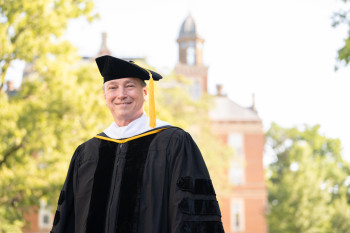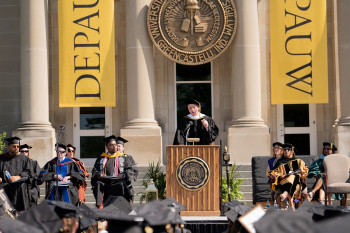Hallward-Driemeier ’89 reflects on a life of blessing others

“How are you going to use this great gift of a DePauw education as you live your lives from here forward?”
That was the question posed to the class of 2024 by Douglas Hallward-Driemeier ’89 during DePauw University’s 185th Commencement ceremony on Sunday, May 19. Beneath sunny skies on the East College lawn, the former assistant to the Solicitor General of the United States and current partner at Ropes & Gray in Washington, D.C. reminded the graduates that their new university degrees would bring them great benefits and even greater responsibilities.
“You are privileged to be graduates of this wonderful school and to enjoy all of the breadth, depth, and rigor of education that your DePauw diploma represents,” Hallward-Driemeier explained. “My challenge to you is that you use your privilege for something larger than yourselves. Live your life so that your time here is a blessing to others.”
This commitment to empathy and allyship has long been a part of Hallward-Driemeier’s own life. Its influence can be traced as far back as the fifth grade, when he had his first experience with public speaking.
“My teacher had read a piece we had all been asked to write, and she asked me to share mine with the class,” he recalls. His piece was about his disappointment over his best friend moving to a different school – a natural emotion for any child of that age. But there was an added layer of sadness in this particular situation; the decision to move schools had been in response to their district’s merger with two other districts nearby, both of which were predominantly black.
“I didn’t understand that,” Hallward-Driemeier laments. “I didn’t understand how other families looking to have the same benefits we have in our school would be a reason for someone to leave.” That disappointment stuck with him, shaping his attitude toward others and nurturing a desire for service. “Trying to understand the experiences of people who don’t have the privilege I do and using my life to help them – that’s something I’ve tried to be about since then.”
In 2015, he had an opportunity to put that philosophy into practice on a national stage. By that point in his career, Hallward-Driemeier had earned a reputation as an accomplished lawyer, having presented cases at all levels, including the Supreme Court. It was in large part due to that experience that he was selected to help argue for marriage equality in the groundbreaking case Obergefell v Hodges. Despite being a straight man in a traditional marriage with his long-time wife Mary, Hallward-Driemeier knew that he could not sit on the sidelines of this issue. Instead, he chose to step up and use his voice on behalf of those who had historically been silenced.
“I was sitting there listening to our lead oralist Mary Bonauto argue the first of two questions, and I actually felt my chest get very tight,” he recalls. “I thought to myself: This would be a very, very bad time to have a heart attack.” Looking back now, he’s able to laugh, but at the time he realized that he was experiencing the full weight of the moment’s historical significance, the tension of what he was about to do.
“I felt the millions of people whose lives and happiness in some respects depended on what I was going to say,” he acknowledges. But he refused to shy away from the moment, instead finding strength in the realization that he had an entire community supporting him, praying for him, and holding him up.
 During his commencement address, Hallward-Driemeier spoke about his experience with the Obergefell v Hodges case, but he was careful to clarify an important point for the graduates. “Allyship is not reserved for such momentous occasions,” he told them. “It can and should be a fundamental part of your everyday life.”
During his commencement address, Hallward-Driemeier spoke about his experience with the Obergefell v Hodges case, but he was careful to clarify an important point for the graduates. “Allyship is not reserved for such momentous occasions,” he told them. “It can and should be a fundamental part of your everyday life.”
As he reflects on the young people seated where he was 35 years earlier, Hallward-Driemeier acknowledges that they are entering a world burdened with deep conflict and division. But he knows that by listening to one another and understanding each other’s longings, the class of 2024 can find their own ways to bring healing.
“It feels like allyship has been a very important theme in my own life and one that’s been very fulfilling. I would hope that the graduates would think of that as a theme and goal for their own lives as well.”
Browse other stories
-
Athletics
-
Women's Golf - Williams Selected Academic All-America®
-
Football - 336 Students Named to 2025 Spring Tiger Pride Honor Roll
-
Football - DePauw-Record 190 Student-Athletes Named to NCAC's Dr. Gordon Collins Scholar-Athlete Honor Roll
More Athletics
-
-
News
-
Outstanding scholars named to Spring 2025 Dean's List
-
Alumni News Roundup - June 6, 2025
-
Transition and Transformation: Inside the First-Year Experience
More News
-
-
People & Profiles
-
11 alums make list of influential Hoosiers
-
DePauw welcomes Dr. Manal Shalaby as Fulbright Scholar-in-Residence
-
DePauw Names New Vice President for Communications and Strategy and Chief of Staff
More People & Profiles
-
-
Have a story idea?
Whether we are writing about the intellectual challenge of our classrooms, a campus life that builds leadership, incredible faculty achievements or the seemingly endless stories of alumni success, we think DePauw has some fun stories to tell.
-
Communications & Marketing
101 E. Seminary St.
Greencastle, IN, 46135-0037
communicate@depauw.eduNews and Media
-
News media: For help with a story, contact:
Bob Weaver, Senior Director of Communications.
bobweaver@depauw.edu.